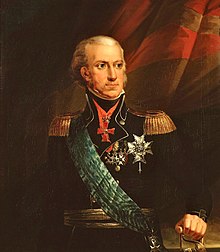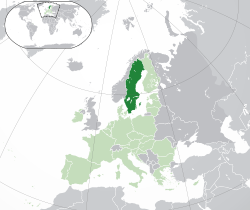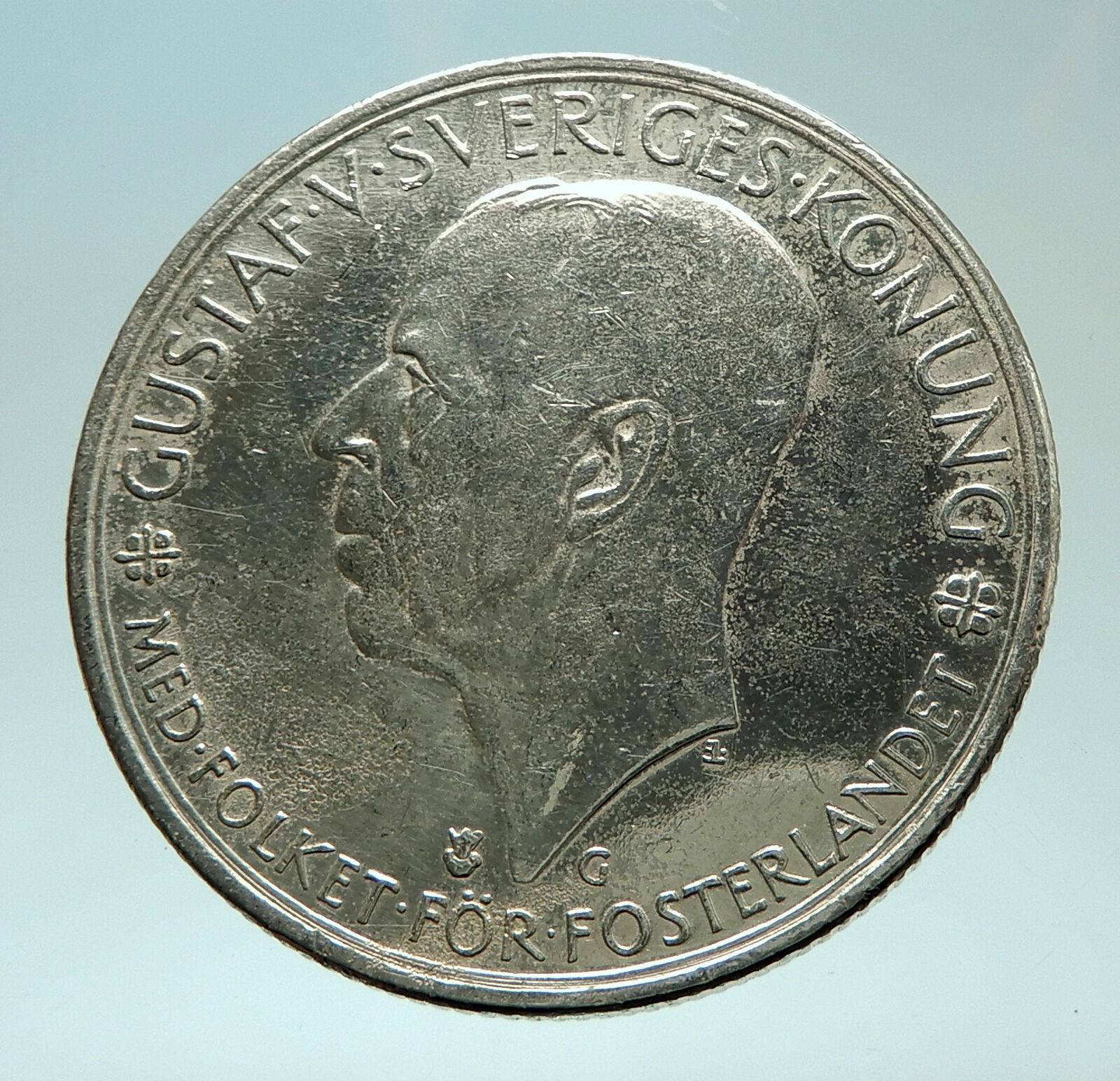|
Sweden – Carl (Charles) XIII – King of Sweden: 6 June 1809 – 5 February 1818 & King of Norway: 4 November 1814 – 5 February 1818
1812 Silver 1/24 Riksdaler 21mm (2.62 grams) 0.382 Silver
Reference: KM# 580 (1810-1816)
FOLKETS VÄL MIN HÖGSTA LAG crowned CC monogram.
1/24. RD. O.L. around crowned coat-of-arms shield; year below.
You are bidding on the exact item pictured, provided with a Certificate of Authenticity and Lifetime Guarantee of Authenticity.
 Charles XIII, or Carl XIII (Swedish: Karl XIII, 7 October 1748 – 5 February 1818), was King of Sweden from 1809 and King of Norway from 1814 to his death. He was the second son (and younger brother to King Gustav III) of King Adolf Frederick of Sweden and Louisa Ulrika of Prussia, sister of Frederick the Great. Charles XIII, or Carl XIII (Swedish: Karl XIII, 7 October 1748 – 5 February 1818), was King of Sweden from 1809 and King of Norway from 1814 to his death. He was the second son (and younger brother to King Gustav III) of King Adolf Frederick of Sweden and Louisa Ulrika of Prussia, sister of Frederick the Great.
Though known as King Charles XIII in Sweden, he was actually the seventh Swedish king by that name, as Charles IX (reigned 1604-1611) had adopted his numeral after studying a fictitious history of Sweden. In Norway he is known as Charles II.
On 13 March 1809, those who had dethroned Gustav IV Adolf appointed Charles regent, and he was finally elected king by the Riksdag of the Estates. By the time he became king, he was 60 years old and prematurely decrepit. In November 1809, he was affected by a heart attack, and was not able to participate in government. The new constitution which was introduced also made his involvement in politics difficult. A planned attempt to enlarge the royal power in 1809�”10 was not put into effect because of his indecisiveness and health condition.
 His incapacity triggered a search for a suitable heir. The initial choice was a Danish prince, Christian August, who took the name Charles August upon being adopted by Charles. However, Charles August died only a few months after his arrival in Sweden. One of Napoleon’s generals, Jean-Baptiste Bernadotte, was then chosen as his successor. The new crown prince took over the government as soon as he landed in Sweden in 1810. Charles’s condition deteriorated every year, especially after 1812, and he eventually became but a mute witness during the government councils chaired by the crown prince, having lost his memory and no longer being able to communicate. His incapacity triggered a search for a suitable heir. The initial choice was a Danish prince, Christian August, who took the name Charles August upon being adopted by Charles. However, Charles August died only a few months after his arrival in Sweden. One of Napoleon’s generals, Jean-Baptiste Bernadotte, was then chosen as his successor. The new crown prince took over the government as soon as he landed in Sweden in 1810. Charles’s condition deteriorated every year, especially after 1812, and he eventually became but a mute witness during the government councils chaired by the crown prince, having lost his memory and no longer being able to communicate.
By the Union of Sweden and Norway on 4 November 1814 Charles became king of Norway under the name Carl II of Norway. After eight years as king only by title, Charles died without a natural heir on 5 February 1818, and Bernadotte succeeded him as King Charles XIV John.
Charles was the 872nd Knight of the Order of the Golden Fleece in Spain.
 Sweden, officially the Kingdom of Sweden, is a Scandinavian country in Northern Europe. It borders Norway and Finland, and is connected to Denmark by a bridge-tunnel across the Öresund. At 450,295 square kilometres (173,860 sq mi), Sweden is the third-largest country in the European Union by area, with a total population of over 9.8 million. Sweden consequently has a low population density of 21 inhabitants per square kilometre (54/sq mi), with the highest concentration in the southern half of the country. Approximately 85% of the population lives in urban areas. Southern Sweden is predominantly agricultural, while the north is heavily forested. Sweden is part of the geographical area of Fennoscandia. Sweden, officially the Kingdom of Sweden, is a Scandinavian country in Northern Europe. It borders Norway and Finland, and is connected to Denmark by a bridge-tunnel across the Öresund. At 450,295 square kilometres (173,860 sq mi), Sweden is the third-largest country in the European Union by area, with a total population of over 9.8 million. Sweden consequently has a low population density of 21 inhabitants per square kilometre (54/sq mi), with the highest concentration in the southern half of the country. Approximately 85% of the population lives in urban areas. Southern Sweden is predominantly agricultural, while the north is heavily forested. Sweden is part of the geographical area of Fennoscandia.

 Germanic peoples have inhabited Sweden since prehistoric times, emerging into history as the Geats/Götar and Swedes/Svear and constituting the sea peoples known as the Norsemen. Sweden emerged as an independent and unified country during the Middle Ages. In the 17th century, it expanded its territories to form the Swedish Empire, which became one of the great powers of Europe until the early 18th century. Swedish territories outside the Scandinavian Peninsula were gradually lost during the 18th and 19th centuries, beginning with the annexation of present-day Finland by Russia in 1809. The last war in which Sweden was directly involved was in 1814, when Norway was militarily forced into personal union. Germanic peoples have inhabited Sweden since prehistoric times, emerging into history as the Geats/Götar and Swedes/Svear and constituting the sea peoples known as the Norsemen. Sweden emerged as an independent and unified country during the Middle Ages. In the 17th century, it expanded its territories to form the Swedish Empire, which became one of the great powers of Europe until the early 18th century. Swedish territories outside the Scandinavian Peninsula were gradually lost during the 18th and 19th centuries, beginning with the annexation of present-day Finland by Russia in 1809. The last war in which Sweden was directly involved was in 1814, when Norway was militarily forced into personal union.
Since then, Sweden has been at peace, maintaining an official policy of neutrality in foreign affairs. The union with Norway was peacefully dissolved in 1905, leading to Sweden’s current borders. Though it was formally neutral through both world wars, Sweden engaged in humanitarian efforts, such as taking in refugees from German-occupied Europe. After the end of the Cold War, Sweden joined the European Union on 1 January 1995, but declined NATO membership.
Today, Sweden is a constitutional monarchy and a parliamentary democracy, with the Monarch as the head of state. The capital city is Stockholm, which is also the most populous city in the country. Legislative power is vested in the 349-member unicameral Riksdag. Executive power is exercised by the Government, chaired by the Prime Minister. Sweden is a unitary state, currently divided into 21 counties and 290 municipalities.
Sweden maintains a Nordic social welfare system that provides universal health care and tertiary education for its citizens. It has the world’s eighth-highest per capita income and ranks highly in numerous metrics of national performance, including quality of life, health, education, protection of civil liberties, economic competitiveness, equality, prosperity and human development. Sweden has been a member of the European Union since 1 January 1995, but declined Eurozone membership following a referendum. It is also a member of the United Nations, the Nordic Council, Council of Europe, the World Trade Organization and the Organisation for Economic Co-operation and Development (OECD).
|




 Charles XIII, or Carl XIII (Swedish: Karl XIII, 7 October 1748 – 5 February 1818), was King of Sweden from 1809 and King of Norway from 1814 to his death. He was the second son (and younger brother to King Gustav III) of King Adolf Frederick of Sweden and Louisa Ulrika of Prussia, sister of Frederick the Great.
Charles XIII, or Carl XIII (Swedish: Karl XIII, 7 October 1748 – 5 February 1818), was King of Sweden from 1809 and King of Norway from 1814 to his death. He was the second son (and younger brother to King Gustav III) of King Adolf Frederick of Sweden and Louisa Ulrika of Prussia, sister of Frederick the Great.  His incapacity triggered a search for a suitable heir. The initial choice was a Danish prince, Christian August, who took the name Charles August upon being adopted by Charles. However, Charles August died only a few months after his arrival in Sweden. One of Napoleon’s generals, Jean-Baptiste Bernadotte, was then chosen as his successor. The new crown prince took over the government as soon as he landed in Sweden in 1810. Charles’s condition deteriorated every year, especially after 1812, and he eventually became but a mute witness during the government councils chaired by the crown prince, having lost his memory and no longer being able to communicate.
His incapacity triggered a search for a suitable heir. The initial choice was a Danish prince, Christian August, who took the name Charles August upon being adopted by Charles. However, Charles August died only a few months after his arrival in Sweden. One of Napoleon’s generals, Jean-Baptiste Bernadotte, was then chosen as his successor. The new crown prince took over the government as soon as he landed in Sweden in 1810. Charles’s condition deteriorated every year, especially after 1812, and he eventually became but a mute witness during the government councils chaired by the crown prince, having lost his memory and no longer being able to communicate.  Sweden, officially the Kingdom of Sweden, is a Scandinavian country in Northern Europe. It borders Norway and Finland, and is connected to Denmark by a bridge-tunnel across the Öresund. At 450,295 square kilometres (173,860 sq mi), Sweden is the third-largest country in the European Union by area, with a total population of over 9.8 million. Sweden consequently has a low population density of 21 inhabitants per square kilometre (54/sq mi), with the highest concentration in the southern half of the country. Approximately 85% of the population lives in urban areas. Southern Sweden is predominantly agricultural, while the north is heavily forested. Sweden is part of the geographical area of Fennoscandia.
Sweden, officially the Kingdom of Sweden, is a Scandinavian country in Northern Europe. It borders Norway and Finland, and is connected to Denmark by a bridge-tunnel across the Öresund. At 450,295 square kilometres (173,860 sq mi), Sweden is the third-largest country in the European Union by area, with a total population of over 9.8 million. Sweden consequently has a low population density of 21 inhabitants per square kilometre (54/sq mi), with the highest concentration in the southern half of the country. Approximately 85% of the population lives in urban areas. Southern Sweden is predominantly agricultural, while the north is heavily forested. Sweden is part of the geographical area of Fennoscandia.
 Germanic peoples have inhabited Sweden since prehistoric times, emerging into history as the Geats/Götar and Swedes/Svear and constituting the sea peoples known as the Norsemen. Sweden emerged as an independent and unified country during the Middle Ages. In the 17th century, it expanded its territories to form the Swedish Empire, which became one of the great powers of Europe until the early 18th century. Swedish territories outside the Scandinavian Peninsula were gradually lost during the 18th and 19th centuries, beginning with the annexation of present-day Finland by Russia in 1809. The last war in which Sweden was directly involved was in 1814, when Norway was militarily forced into personal union.
Germanic peoples have inhabited Sweden since prehistoric times, emerging into history as the Geats/Götar and Swedes/Svear and constituting the sea peoples known as the Norsemen. Sweden emerged as an independent and unified country during the Middle Ages. In the 17th century, it expanded its territories to form the Swedish Empire, which became one of the great powers of Europe until the early 18th century. Swedish territories outside the Scandinavian Peninsula were gradually lost during the 18th and 19th centuries, beginning with the annexation of present-day Finland by Russia in 1809. The last war in which Sweden was directly involved was in 1814, when Norway was militarily forced into personal union.




